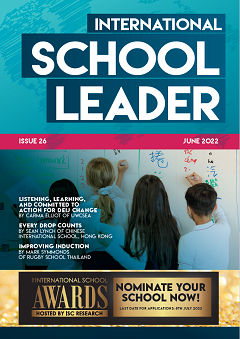By Magnus Cowie, Alan Stevens, Diane Trif, Rachel Eaton-Jones, Andy Gough and Duncan Ogilvie
Marlborough College Malaysia won the strategic leadership award at the 2022 International School Awards for a whole-school positive psychology and wellbeing initiative for students and staff, involving a wellbeing researcher-in-residence and peer group mental health first-aiders for staff.
The importance of wellbeing at an operational and strategic level within schools is now widely accepted. It may have taken extreme events over the past few years to bring this about, but it is to the benefit of all (students, staff and parents) that it has.
At Marlborough College Malaysia (MCM), when we were considering a strategic commitment that resonated with the values of our college and provided all members of our community with a clear framework for flourishing founded on the principles of positive psychology, we decided this would have to be developed in-house.
In outlining our journey in this article, different staff answered some key questions. We hope that our story will be of interest to others and we are happy to help schools in any areas they wish to discuss (as we are doing already in our capacity as one of the five COBIS Beacon Schools in Wellbeing).
Q: Why conduct wellbeing research and data analysis in-house when there are many journals and research papers already written on wellbeing?
A: Alan Stevens (Master): At MCM we wanted to benefit from the most current research into positive psychology, but we also wanted its application to be tailored to the very distinctive and evolving needs of our College community – pupils and staff – as well as aligning with and drawing strength from our core values and the culture of the college community.
To secure robust underpinning research, we recruited as a Researcher-in-Residence one of Prof Martin Seligman’s MA graduates from the University of Pennsylvania’s world-leading School of Applied Positive Psychology. Her in-house research was conducted in a series of staff and pupil surveys, which remain ongoing. These informed the development of a relevant wellbeing programme that addressed actual rather than perceived needs and was also sufficiently flexible to adjust as those needs evolved in changing conditions, such as those produced by the pandemic. The responses did not always make comfortable reading for leaders, but they were an honest and sometimes surprising expression of needs and helped to direct the response.
Our Researcher-in-Residence used her immersive background to explain her in-house data analysis through lenses of wider research, helping us to understand the challenges and also the measures which might be most effective in building resilience and psychological capital.
Q: What are the key indicators that the school uses in judging wellbeing amongst pupils and amongst staff?
A: Diane Trif (Researcher-in-Residence): In order to get a full understanding of the wellbeing landscape at MCM, we use various key indicators, both formal and informal. For pupils, a self-report tracker is run weekly on Friday where pupils get a chance to input their feelings about their week in six key domains: sleep, nutrition, exercise, emotions, social interactions and media balance. They mark each on a scale of 1 (lowest) to 5 (highest) in each category, and then have a chance to explain their scores in a comments section. The purpose of the pupil tracker is mainly for self-reflection. However, their answers do confidentially get shared with their tutor who can follow up if there are any concerning trends or comments made.
The pupil tracker also gives us data to measure how pupils are doing across the school year and monitor trends over time. We are able to notice any dips or changes to the overall climate as noted in the diagram below.
For tracking staff wellbeing, we also use a mixture of quantitative and qualitative markers. We run a yearly formal staff wellbeing survey that measures constructs like physical wellbeing, psychological wellbeing, school belonging, mattering and teacher self-efficacy.
In addition to these qualitative measures, the survey also hosts a comments section where staff are encouraged to offer feedback and suggestions in writing.
Informally, we have a nominated group of trained staff peers who periodically check in with others and take the ‘temperature’ of the culture. This group is able to feedback to leadership on what they believe is needed to make improvements to staff offerings. They are trained in positive psychology principles so they are also able to provide informal support to others as needed.
In using multiple measurements compiled through self-reports, surveys and informal one-on-one conversations, we are able to measure and track the overall wellbeing climate of the school and make adjustments. These markers stem from our model that identified our four key dimensions of wellbeing: body, mind, spirit and community.
Q: What words and wellbeing language complements the Marlborough College Malaysia Flourish@MCM agenda? Which words conflict and do the words matter?
A: Rachel Eaton-Jones (Head of Prep School): Knowing how important our language is in establishing the ethos of a school, underpinning the development of relationships, this was a really critical initial question for us to consider.
We had sessions in common room meetings where ‘lazy’ language was identified and we came up with ‘better’ alternatives and a commitment to rephrase conversations in classrooms and beyond. We changed our ‘school rules’ to ‘strengths’, emphasising the positive, and made a commitment that every communication with families would identify a positive aspect of a child’s behaviour as well as identifying a need for conversation about a concern.
Even in our most informal gatherings, we try to maintain a language that is supportive so that it becomes our habit. Breaktime spaces have been enhanced and are used to celebrate pupils’ success and encourage support. Our words shape our behaviours. Yes, we do all need to be able to let off steam, and that includes the occasional blast of frustration that doesn’t necessarily include encouraging use of language ¬– but that is the exception and is inevitably followed by an apology. This constructive approach sees adults and children modelling an environment in which children can flourish. Do words matter? Without doubt.
Q: How does the wellbeing model shape behavioural fundamentals within school life such as our updated Rewards and Sanctions?
A: Andy Gough (Deputy Head Pastoral in the Prep School): The idea of feeling valued and having a sense of belonging is very much a part of our culture. Positive behaviour of both staff and pupils is inculcated through conversation, compassion and companionship. Our Rewards and Sanctions policy, for example, reflects this by focusing on celebrating commitments that align with the college values and on pupils owning their behaviour.
Effort and continuous reflection, especially with regard to impactful behaviour affecting others, are guided and supported by caring and positive relationships and conversations throughout the college. To achieve buy-in from our staff, including support staff, and the parent body, we have focused a great deal on the language stemming from the model – highlighting character strengths has helped foster positive relationships, engagement and purpose throughout our community. Our pupils have been, and remain, fully involved in drawing up rewards that align with body, mind, spirit and community and sanctions that encourage pupils to learn from mistakes and appreciate why we believe in Flourishing@MCM.
Q: What did Marlborough College Malaysia do to engage pupils, staff and parents with digital wellbeing throughout such a challenging time?
A: Duncan Ogilvie (Director of Digital Learning): We recognised that probably the greatest risk to an individual flourishing lay in the murky world of cyberspace which provides so many opportunities but also significant risks. In the words of Rushton Hurley we aim to “inspire and be inspired”. We identified the need to share our collective experiences of the digital world whilst acknowledging a new set of challenges that would require new boundaries and identification of the ever-changing online risks.
As part of pupil engagement, each house is represented at a weekly Digital Ambassadors (DAs) meeting. The DAs led a number of initiatives, reviewing the structure of the day and online risks. A new MCMDigi Site was created to support pupils and staff, with initiatives focussing on digital wellbeing and healthy routines when working on computers for prolonged periods of time which included appropriate digital breaks. They regularly presented to house and school assemblies whilst producing a wide range of resources about staying safe online across a wide variety of social media platforms.
As well as launching the National Online Safety App to our staff and parents, a webinar series “Your Digital Life” was created for parents which addressed a variety of digital well-being topics. This was hosted by our pastoral team and DAs. It coincided with the launch of the MCM Digital Charter and Digital Commitment, which have been curated by our DAs and staff, both of which relate to the Common Sense Media themes and the core values of MCM.






Alan Stevens is Master, Diane Triff is Researcher-in-Residence, Rachel Eaton-Jones is Head of Prep School, Andy Gough is Prep Deputy Head Pastoral, Duncan Ogilvie is Director of Digital Learning, and Magnus Cowie is Deputy Head Pastoral at Marlborough College Malaysia. Connect with them all on LinkedIn.


